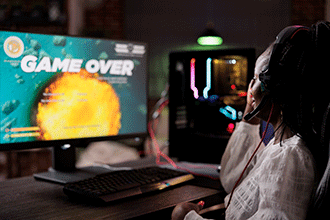Are video games bad for your health?

How do video games affect health and vision?
Video games are a great source of entertainment, socializing and even education for both children and adults. But they can also cause health problems on the inside and out. This can include anything from poor sleep to low self-esteem. Too much time in front of the screen can also harm vision.
Excess time spent playing video games can also cause joint and muscle pain.
Despite these unfavorable factors, video games can actually improve some aspects of health. For example, vision disorders such as amblyopia can be treated with special video games. Games that require team building and other multiplayer features can also improve social skills.
Mental health
Gaming: Is it good or bad for your mental health? There are several studies that point in both directions. In either case, consider limiting your screen time so that you can live a balanced life.
Negative effects of video games on mental health
Many experts believe that video games can have a negative effect on mental health. This includes symptoms like:
Flawed coping strategies
Poor academic performance
Low self-esteem
Loneliness and tendencies to isolate
Negative feelings and outlooks
These unfavorable side effects can interrupt daily life. Poorly influenced decisions and emotional states can make life harder. Playing video games can also be habit-forming. So, like other activities, limiting your time with video games is recommended.
Additional measures may need to be taken if video games cause too many problems for one’s frame of mind. Never hesitate to talk to your doctor about your psychological symptoms and what could be contributing to them.
Positive effects of video games on mental health
On the other hand, some research points out that video games can improve mental health in several aspects. A 2021 study completed by JMIR Serious Games showed that mental and social skills are positively affected by some video games.
Different game genres can heighten a gamer’s mental skill sets. In turn, this can improve moods, increase social skills and even help with emotional coping methods. For example, goal-oriented games increase motivation in life outside the screen. Multiplayer games improve social skills by having players work together virtually.
High scores and achieving higher levels in a game give players a sense of accomplishment. This can reflect positively on other life goals. And of course, the enjoyment and entertainment gamers feel as they play are positive feelings.
Some of the games and their corresponding benefits that were noted include the following:
Increased social skills — multiplayer, adventure and role-playing games, like Minecraft, Fortnite and Among Us.
Improved anxiety and depression — role-playing, strategy and commercial video games, such as Angry Birds, Candy Crush and Tap the Frog. Exergames (video games that involve physical aspects, such as Nintendo Wii sports and fitness) can also improve depression and anxiety.
Anxiety prevention — commercial video games such as Rayman.
Improved cognitive skills — various adventure and strategy games.
More stable moods and emotions — commercial video games, like Tap the Frog and Portal 2.
Stronger goal-setting and achieving —Team Fortress 2, Portal 2 and other commercial games.
Researchers found that some cognitive skill games can even improve dyslexia symptoms in some individuals.
Since video games can have both positive and negative effects on mental health, check in with yourself before and after playing. It’s important to recognize your moods and emotional states so that you can understand which games make them better or worse.
Eye health
Video games may also affect your eye health. One of the most commonly reported disorders associated with video games and excessive screen time is a condition known as computer vision syndrome (CVS).
When the eyes focus on a brightly lit screen for too long, it can cause strain. This can then lead to symptoms such as dry eyes, blurred vision and headaches. But focusing on the screen for a long period of time isn’t the only risk factor. Screen glares, poor posture and improper lighting can all contribute to the discomfort.
If you have an uncorrected vision problem such as myopia (nearsightedness), it can make symptoms even worse. This is because the eyes have to stress even more in order to focus.
Fortunately, there is a way to combat these problems:
Employ the 20-20-20 rule – take a break every 20 minutes to view an object that is 20 feet or more away from you for 20 seconds.
Try a pair of gaming or computer glasses to help filter blue light emitted by digital screens.
Limit screen time altogether, if possible.
Get your eyes and vision checked on a yearly basis.
Use good posture when sitting down to play a game. Be sure you are not sitting too close to the screen.
SEE RELATED: Do gaming glasses really work?
Can video games help vision?
Studies show that the possibility is real for video games to benefit some conditions, such as amblyopia (lazy eye).
Amblyopia occurs when one eye does not reach visual acuity, even with the help of contacts or eyeglasses. In many cases, ophthalmologists correct lazy eye by patching the dominant eye in order to strengthen the weaker eye. (Other treatments may be needed for severe cases).
A 2016 study conducted by the Retina Foundation of the Southwest found that certain video games can aid in correcting amblyopia in children. Over a two week period, 28 children with amblyopia were placed in two different groups and received different treatments for their condition.
One group of children wore an eyepatch for two hours a day, for every day over this period (28 hours total). The other group engaged in a binocular iPad game while wearing special anaglyph (3D) eyeglasses for one hour a day during 10 days of the study (a total of 10 hours). Both the eyepatches and the anaglyph glasses that were used made the weaker eyes work harder in each individual.
The group of children who played the iPad game achieved a greater improvement in visual acuity than the group who used patching. What’s more — the group that played games achieved greater results in a shorter period of time.
The study found that the children who played video games improved their visual acuity by 1.5 lines. The children who wore patches improved theirs by just 0.7 lines.
READ MORE: Video games can help correct lazy eye in children
Personal appearance and self-esteem
Several studies highlight the damage video games can have on social skills and self-esteem. But it can go deeper than that for many gamers.
Winning vs. losing

Some of the most obvious challenges of a video game include conquering villains, moving through difficult levels and beating the highest score. Each of these can cause both good and bad emotional reactions for players.
A sense of accomplishment and achievement usually occurs when someone wins a game or conquers a difficult level. But if they fail, it can cause a much worse emotional reaction.
Depending on how invested you are in a game, either outcome could affect your life away from the screen.
Games can give unrealistic body expectations
Video game characters can also impact a person’s body image. In one study, male participants were assigned characters for a game at random. Some played in the role of a highly muscular character while others played one with a more average build.
Those who played as the muscular characters had much more negative attitudes toward their own bodies when the game was over. The study concluded that unrealistically muscular video game characters can lower the self-esteem of gamers who feel they cannot achieve the same level of physique.
Personal avatars allow for more freedom
On the other hand, there is a possibility that self-esteem can be raised by playing video games — for a similar reason. Certain video games, such as World of Warcraft, allow the user to create a character or avatar of their own, rather than choosing from a group of pre-designed characters.
Researchers agree that the self-creation aspect gives gamers a higher sense of freedom to be whomever they want to be. And this can be quite positive for many.
It’s easier said than done for many people — but if possible, try not to take games and virtual life so seriously. Reminding yourself that it’s all in good fun can prevent harm to your self-esteem and mental health.
What about obesity? Although obesity has been thought to be linked to playing video games, studies have found that there is not a direct connection between the two.
Sleep
How do video games affect sleep? Playing games too close to bedtime can increase brain activity and make you too excited or wound up to rest effectively. The bright lights on the screen of your computer or television can also make falling asleep difficult. But why does this matter?

First, you need to understand why sleep is so important. Both the quantity and quality of sleep have a large impact on daily life. Poor sleep can contribute to focusing problems, negative moods and a lack of productivity. A good night’s rest, on the other hand, allows you to be more alert and content in both physical and mental capacities.
There are four different stages of sleep that are all crucial to the process. Stages 1, 2 and 3 are all non-rapid eye movement (NREM) stages, while stage 4 is the rapid eye movement (REM) stage.
Stage 1 (NREM) – Breathing, heart rate and brain waves slow down during this light sleeping stage.
Stage 2 (NREM) – Breathing and heart rates continue to decline, and the muscles relax as you fall deeper into sleep.
Stage 3 (NREM) – Heart rate, breathing and brain waves reach the lowest point during this sleeping stage.
Stage 4 (REM) – Blood pressure, heart rate and breathing all increase during the REM cycle. The eyes move rapidly beneath the eyelids and dreaming also occurs.
Each phase of sleep is needed in order to feel refreshed and prepared for the next day. But there are many popular activities that can interrupt a good night’s rest, including video games and other types of screen time.
Research shows that playing video games before bed interferes most with the REM cycle of sleep. But it contributes to a decrease in overall sleep quality. Additionally, gaming for an hour a day or longer increases the chances of poor sleep by 30%, according to a 2014 study.
To improve sleep, consider limiting your gaming time to an hour or less a day. And try not to game too close to your bedtime.
Can video games ever help with sleep? It’s possible but not guaranteed. Studies have shown that video games can help relieve anxiety, which may help some clear their heads before bed. But be sure to take the negative effects on sleep into consideration.
SEE RELATED: Effects of sleep deprivation
Physical pain tolls
Although video games are often played in a seated position, many parts of the body are used — and it can be painful. Factors such as poor posture, sitting in the same position for long periods of time and excessive use of the hands and wrists can all negatively affect physical health.
Musculoskeletal pain
Many gamers sit in the same position, with the same posture, for significant periods of time while they play video games. This can cause a negative effect on the structure of the body. Back, joint, wrist, neck and arm or elbow pain are often reported by gamers.
Joints are designed to move, so when they are restricted, it can be painful and cause lasting effects.
Experts suggest the following tips:
Use a computer stand to keep the screen at eye level. This will help reduce neck strain.
Keep the body in proper alignment and use a chair with back support.
Take frequent breaks to stretch your muscles.
Limit your gaming time.
Do video games cause carpal tunnel syndrome?
Video games require heavy use of your hands and wrists, as the vast majority are played with a handheld controller or a computer keyboard. It’s been a popular belief that excessive typing, keyboard or mouse use can cause carpal tunnel syndrome. However, studies have not been able to prove this connection.
Repetitive movements of the hand can cause inflammation problems such as tendinitis (inflammation in the tendon) and bursitis (inflammation in the bursae [structures that cushion joints]). Both of these conditions can then lead to carpal tunnel syndrome.
To reduce pain in the joints, muscles and other parts of the body, be sure to take plenty of breaks during your designated gaming time.
Seizures
Have you ever noticed the health warnings that appear on a screen before your game begins? Often, these warnings include a warning for photosensitivity and epileptic seizures.
Flashing lights and rapid light patterns in video games can pose a risk for those who have epilepsy. This is due to a condition called photosensitive epilepsy, and about 3% of epileptic patients experience it.
Numerous factors can trigger seizures, including strobe lights, fast-moving patterns on TV screens and the bright, rapid moving illustrations in video games.
If you are a gamer and have photosensitive epilepsy, there are certain steps you can take to prevent having a seizure. This includes:
Turn down the brightness on your screen.
Play games in a well-lit environment, and sit at least two feet away from the screen.
Take breaks from playing when possible (consider a 15 minute break for every hour). Locking your eyes on the screen for too long without an adequate break can raise the risk of a seizure.
Avoid blinking too much while looking at the screen, as this can also encourage a seizure.
Turn off the game if you are tired or if you begin to experience body jerks or uneasy feelings.
Consider wearing anti-glare or blue light glasses to reduce brightness.
Not every video game or individual trigger is guaranteed to cause a seizure, and some people may be more sensitive than others. Nevertheless, it’s important to be cautious and understand the risks.
Report any seizures you experience while playing a video game to your doctor. They may recommend that you stop playing video games for a certain period of time after the seizure occurs.
The takeaway
Many health problems can occur when you play video games for an extended or excessive amount of time. Like many activities, indulging video games and other digital activities should be done in moderation. At the very least, they should be done with protection such as computer glasses, proper lighting and a healthy mindset.
Despite the complications (dry eyes, poor sleep, joint pain and more), video games can improve some aspects of your life. This may include improving your social and cognitive skills with strategy and multiplayer games. Children with vision disorders such as amblyopia can also benefit from iPad games that work to train the eyes and improve visual acuity.
For an optimal balance between your health and your video game consumption, check in with yourself and take a step back when needed. And don’t forget to get your vision checked every year to ensure any focusing issues are corrected. Finally, self-monitor your physical and mental health both on and off the screen.
READ NEXT: Can VR headsets harm your eyes?
The association between video gaming and psychological functioning. Frontiers in Psychology. July 2019.
Gaming your mental health: A narrative review on mitigating symptoms of depression and anxiety using commercial video games. JMIR Serious Games. June 2021.
Computer vision syndrome. American Optometric Association. Accessed May 2022.
Binocular iPad game vs patching for treatment of amblyopia in children. JAMA Ophthalmology. December 2016.
Retina Foundation of the Southwest. Retina Foundation of the Southwest. Accessed May 2022.
Are video games, screens another addiction? Mayo Clinic Health System. November 2021.
Do video games drive obesity? ScienceDaily. July 2019.
Virtual ideals: The effect of video game play on male body image. The Undergraduate Review, Bridgewater State University. 2013.
The ideal elf: identity exploration in World of Warcraft. CyberPsychology & Behavior. August 2007.
Does playing video games before bedtime affect sleep? Cureus. June 2019.
Why do we need sleep? Sleep Foundation. March 2022.
Sleep quality is negatively related to video gaming volume in adults. Journal of Sleep Research. October 2014.
Pain and musculoskeletal pain syndromes related to computer and video game use in adolescents. European Journal of Pediatrics. June 2006.
Video game injuries. American Chiropractic Association. Accessed May 2022.
Computer use and carpal tunnel syndrome: A case-control study. Indian Journal of Occupational and Environmental Medicine. December 2017.
Carpal tunnel syndrome. Mount Sinai. June 2021.
Health Warning (US). PlayStation. Accessed May 2022.
Photosensitivity and seizures. Epilepsy Foundation. Accessed May 2022.
Page published on Thursday, June 2, 2022
Medically reviewed on Saturday, May 14, 2022







